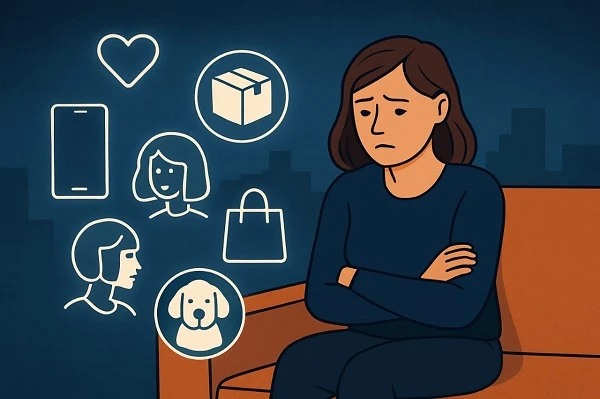Last Updated: July 4, 2025
The Business of Loneliness: How Brands Are Profiting from an Isolated Generation

In today's hyperconnected yet emotionally distant world, loneliness is no longer just a social issue — it has quietly become a multi-billion dollar industry. As human interactions shift online and genuine social connections weaken, a wide range of companies are stepping into the void, selling emotional substitutes and experiences that promise to fill the gaps left by real human relationships.
The Rise of the Loneliness Economy
According to studies by Cigna and Harvard, more than 60% of adults report feeling "seriously lonely." With remote work, urbanization, and digital distractions on the rise, feelings of isolation have skyrocketed. Where there is a widespread human need, there is inevitably a business opportunity — and brands across industries have found ways to monetize the emotional vulnerability of lonely consumers.
Products and services that address (or exploit) loneliness now span a broad spectrum: dating apps, virtual pet companies, AI companions, mental health apps, gaming platforms, and even subscription box services tailored to "self-care" and "me-time."
Key Industries Profiting from Loneliness
1. Dating Apps: Love as a Subscription Model
Dating apps like Tinder, Bumble, and Hinge have turned the quest for love into a recurring revenue stream. Although these platforms market themselves as tools to connect people, their financial success often depends on keeping users searching rather than finding. Premium subscriptions, boosts, and "Super Likes" fuel an endless cycle of swiping, rarely delivering lasting relationships. In fact, studies show that heavy users of dating apps often report greater feelings of loneliness than non-users.
2. AI Companions: Friends for Hire
AI-driven applications like Replika and Anima offer virtual friendships or romantic relationships. These bots are trained to simulate empathy, affection, and conversation, providing the illusion of connection without the complexities of real human interaction. Some users even pay for premium upgrades that allow deeper "emotional bonds," blurring the line between technological advancement and emotional exploitation.
3. Gaming Platforms: Building Digital Realities
Massively multiplayer online (MMO) games like Fortnite, World of Warcraft, and Roblox provide immersive worlds where players can build social status and community — often compensating for isolation in their real lives. The more time users spend in these virtual realms, the more they invest in digital currencies, cosmetic upgrades, and subscriptions, feeding a highly profitable cycle for gaming companies.
4. Subscription Boxes: Self-Care Capitalism
Subscription services such as FabFitFun, BarkBox, or bespoke wellness kits capitalize on the loneliness narrative by offering "comfort in a box." Many subscription models sell not just products, but an emotional experience — promising users a sense of being cared for, pampered, or thought about, even when no real human connection is involved.
5. Pet Industry: The Rise of Companion Animals
Loneliness has fueled an explosion in pet adoptions, and with it, a booming industry around pet care, luxury accessories, and "pet parenting." Companies like Chewy, PetSmart, and countless boutique brands cater to emotional bonds between owners and pets, often marketing products that frame pets as full-fledged family members or emotional support systems.
The Dark Side: Prolonging Isolation for Profit
While some brands genuinely offer products and services that can ease loneliness, others have a financial incentive to perpetuate it. Businesses thrive when customers remain emotionally dependent, continually seeking connection through paid experiences. True healing — forming meaningful, offline relationships — would ultimately reduce the need for many of these products, something that is quietly discouraged through marketing tactics.
Moreover, algorithms on social platforms often prioritize content that triggers emotional responses such as sadness, envy, or fear, encouraging addictive usage patterns that deepen isolation over time.
Psychological Manipulation in Marketing
Modern marketing tactics increasingly tap into psychological vulnerabilities related to loneliness. Emotional marketing campaigns use warm tones, sentimental music, and messages about "belonging" to create deep, almost subconscious connections between the brand and the consumer's need for companionship.
Brands that offer "personalized" experiences — from Spotify's custom playlists to Netflix's recommendations — simulate the feeling of being understood and cared for, even though these interactions are algorithmically generated and financially motivated.
Is There an Ethical Way to Address Loneliness?
There are businesses actively working to foster real human connection. Community-driven apps like Meetup, therapy platforms like BetterHelp, and initiatives promoting mental wellness show that ethical solutions are possible. However, they often operate at a disadvantage compared to companies that offer instant gratification without requiring personal effort or vulnerability.
How Consumers Can Protect Themselves
Understanding the mechanics of the loneliness economy is the first step toward empowerment. Here are some practical tips:
- Be mindful of how apps and services make you feel over time.
- Prioritize in-person social interactions whenever possible.
- Support brands that actively foster community and mental wellness.
- Set boundaries with digital consumption, particularly on emotionally charged platforms.
Conclusion: Loneliness as a Commodity
The monetization of loneliness reflects a broader shift in how human needs are addressed — not through community, but through consumption. While some companies genuinely offer pathways toward connection, others exploit isolation for endless profit. In an age where emotions are increasingly targeted as market opportunities, recognizing the business of loneliness is critical for anyone who values authentic connection in an increasingly disconnected world.
